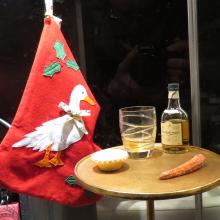
Staff at Ampersand Interiors on Dublin Street have been looking forward to Christmas for weeks.
Their window shows a period fireplace, stockings prepped and ready, and a little something for Father Christmas and his reindeer to keep them going on the big night.
In fact, the little something for the reindeer has been getting littler and littler as the month has progressed. Last time we last saw it, the carrot in question was looking distinctly shrivelled.
Of course, leaving alcohol or carrots out on Christmas Eve is just a piece of sentimental nonsense, and readers will naturally be wondering at this stage what reindeer really prefer to chew on when delivering presents to good children around the world.
Juveniles whose antlers have not grown long enough for this task will nuzzle their way down, which behaviour – in areas of granular ice – can wear away or inflame nasal membranes resulting in the famous (since 1939) red-nose condition. Licking salt from roads has been observed to produce the same effect in humans.
Reindeer will also supplement their diet with birds' eggs, Arctic char (a kind of pre-cooked fish) and even lemmings during periods of nutritional stress. If you can't find a lemming at this short notice, try a pet guinea pig with which you have lost patience.
The earliest evidence of flying reindeer appears in an American poem of 1823 written by either Clement Clarke Moore or Henry Livingstone Jnr. This work is also the origin of Santa's Christmas Eve visit, which date was chosen to deflect Protestant disapproval of a supposedly 'superstitious' Roman Catholic celebration of Christmas Day.
A Visit from St Nicholas
'Twas the night before Christmas, when all thro' the house
Not a creature was stirring, not even a mouse;
The stockings were hung by the chimney with care,
In hopes that St. Nicholas soon would be there;
The children were nestled all snug in their beds,
While visions of sugar plums danc'd in their heads,
And Mama in her 'kerchief, and I in my cap,
Had just settled our brains for a long winter's nap —
When out on the lawn there arose such a clatter,
I sprang from the bed to see what was the matter.
Away to the window I flew like a flash,
Tore open the shutters, and threw up the sash.
The moon on the breast of the new fallen snow,
Gave the luster of mid-day to objects below;
When, what to my wondering eyes should appear,
But a miniature sleigh, and eight tiny reindeer,
With a little old driver, so lively and quick,
I knew in a moment it must be St Nick.
More rapid than eagles his coursers they came,
And he whistled, and shouted, and call'd them by name:
'Now! Dasher, now! Dancer, now! Prancer and Vixen,
'On! Comet, on! Cupid, on! Dunder and Blixem;
'To the top of the porch! To the top of the wall!
'Now dash away! Dash away! Dash away all!'
As dry leaves that before the wild hurricane fly,
When they meet with an obstacle, mount to the sky;
So up to the house-top the coursers they flew,
With the sleigh full of toys — and St Nicholas too:
And then in a twinkling, I heard on the roof
The prancing and pawing of each little hoof.
As I drew in my head, and was turning around,
Down the chimney St Nicholas came with a bound:
He was dress'd all in fur, from his head to his foot,
And his clothes were all tarnish'd with ashes and soot;
A bundle of toys was flung on his back,
And he look'd like a peddler just opening his pack:
His eyes — how they twinkled! His dimples: how merry,
His cheeks were like roses, his nose like a cherry;
His droll little mouth was drawn up like a bow,
And the beard of his chin was as white as the snow;
The stump of a pipe he held tight in his teeth,
And the smoke it encircled his head like a wreath.
He had a broad face, and a little round belly
That shook when he laugh'd, like a bowl full of jelly:
He was chubby and plump, a right jolly old elf,
And I laugh'd when I saw him in spite of myself;
A wink of his eye and a twist of his head
Soon gave me to know I had nothing to dread.
He spoke not a word, but went straight to his work,
And fill'd all the stockings; then turn'd with a jerk,
And laying his finger aside of his nose
And giving a nod, up the chimney he rose.
He sprung to his sleigh, to his team gave a whistle,
And away they all flew, like the down of a thistle:
But I heard him exclaim, ere he drove out of sight —
'If you want my opinion, it's all got too bloody commercial'.